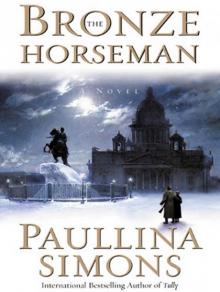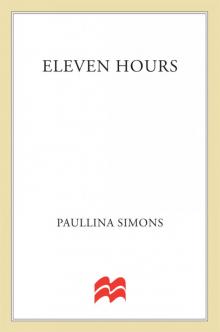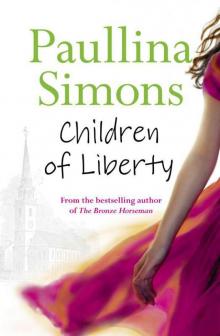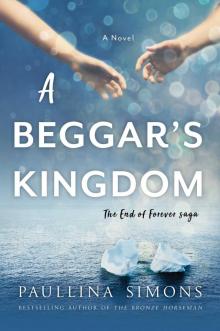- Home
- Paullina Simons
The Bronze Horseman
The Bronze Horseman Read online
THE
BRONZE
HORSEMAN
Paullina Simons
CONTENTS
Part One: The Lucent Dusk
THE FIELD OF MARS
UNCHARTED TIDES
SMOKE AND THUNDER
IMPALED IN SPACE
Part Two: Winter’s Fierce Embrace
BESET AND BESIEGED
NIGHT SANK DOWN
PETER’S DARKENED CITY
FORTRESS PIECES
ACROSS THAT FORMIDABLE SEA
Part Three: Lazarevo
SCENTING SPRING
DESOLATE WAVES
Part Four: In Live Defiance
WORN OUT WITH TERROR AND MISGIVING
A WINDOW TO THE WEST
IN STORIED BATTLES
IN THE MOONLIGHT’S PALLID GLAMOUR
Appendix: Lev and Maria’s Story: Paullina Simons’s Tribute to Her Grandparents, Survivors of Russia’s Terrible Twentieth Century
ABOUT THE AUTHOR
CREDITS
Other Books by Paullina Simons
Copyright
ABOUT THE PUBLISHER
For my beloved grandparents, Maria and Lev Handler, who have lived through World War I, the Russian Revolution and the Russian Civil War, who have lived through World War II, the siege of Leningrad and evacuation, through famine and purges, through Lenin and Stalin, and in the golden twilight of their lives, through twenty non-air-conditioned summers in New York. God bless you.
Hence in a season of calm weather
Though inland far we be,
Our Souls have sight of that immortal sea
Which brought us hither,
Can in a moment travel thither,
And see the Children sport upon the shore,
And hear the mighty waters rolling evermore.
William Wordsworth
Book One
LENINGRAD
Part One
THE LUCENT DUSK
THE FIELD OF MARS
LIGHT came through the window, trickling morning all over the room. Tatiana Metanova slept the sleep of the innocent, the sleep of restless joy, of warm, white Leningrad nights, of jasmine June. But most of all, intoxicated with life, she slept the exuberant sleep of undaunted youth.
She did not sleep for much longer.
When the sun’s rays moved across the room to rest at the foot of Tatiana’s bed, she pulled the sheet over her head, trying to keep the daylight out. The bedroom door opened, and she heard the floor creak once. It was her sister, Dasha.
Daria, Dasha, Dashenka, Dashka.
She represented everything that was dear to Tatiana.
Right now, however, Tatiana wanted to smother her. Dasha was trying to wake her up and, unfortunately, succeeding. Dasha’s strong hands were vigorously shaking Tatiana, while her usually harmonious voice was dissonantly hissing, “Psst! Tania! Wake up. Wake up!”
Tatiana groaned. Dasha pulled back the sheet.
Never was their seven-year age difference more apparent than now, when Tatiana wanted to sleep and Dasha was . . .
“Stop it,” Tatiana muttered, fishing helplessly behind her for the sheet and pulling it back over her. “Can’t you see I’m sleeping? What are you? My mother?”
The door to the room opened. Two creaks on the floor. It was her mother. “Tania? You awake? Get up right now.”
Tatiana could never say that her mother’s voice was harmonious. There was nothing soft about Irina Metanova. She was small, boisterous, and full of indignant, overflowing energy. She wore a kerchief to keep her hair back from her face, for she had probably already been down on her knees washing the communal bathroom in her blue summer frock. She looked bedraggled and done with her Sunday.
“What, Mama?” Tatiana said, not lifting her head from the pillow. Dasha’s hair touched Tatiana’s back. Her hand was on Tatiana’s leg, and Dasha bent over as if to kiss her. Tatiana felt a momentary tenderness, but before Dasha could say anything, Mama’s grating voice intruded. “Get up quick. There’s going to be an important announcement on the radio in a few minutes.”
Tatiana whispered to Dasha, “Where were you last night? You didn’t come in till well past dawn.”
“Can I help it,” Dasha whispered with pleasure, “that last night dawn was at midnight? I came in at the perfectly respectable hour of midnight.” She was grinning. “You were all asleep.”
“Dawn was at three, and you weren’t home.”
Dasha paused. “I’ll tell Papa I got caught on the other side of the river when the bridges went up at three.”
“Yes, you do that. Explain to him what you were doing on the other side of the river at three in the morning.” Tatiana turned over. Dasha looked particularly striking this morning. She had unruly dark brown hair and an animated, round, dark-eyed face that had a reaction for everything. Right now that reaction was cheerful exasperation. Tatiana was exasperated herself—less cheerfully. She wanted to continue sleeping.
She caught a glimpse of her mother’s tense expression. “What announcement?”
Her mother was taking the bedclothes off the sofa.
“Mama! What announcement?” Tatiana repeated.
“There is going to be a government announcement in a few minutes. That’s all I know,” Mama said doggedly, shaking her head, as if to say, what’s not to understand?
Tatiana was reluctantly awake. Announcement. It was a rare event when music would be interrupted for a word from the government. “Maybe we invaded Finland again.” She rubbed her eyes.
“Quiet,” Mama said.
“Or maybe they invaded us. They’ve been wanting their borders back ever since losing them last year.”
“We didn’t invade them,” said Dasha. “Last year we went to get our borders back. The ones we lost in the Great War. And you should stop listening to adult conversations.”
“We didn’t lose our borders,” Tatiana said. “Comrade Lenin gave them away freely and willingly. That doesn’t count.”
“Tania, we are not at war with Finland. Get out of bed.”
Tatiana did not get out of bed. “Latvia, then? Lithuania? Byelorussia? Didn’t we just help ourselves to them, too, after the Hitler-Stalin pact?”
“Tatiana Georgievna! Stop it!” Her mother always called her by her first and patronymic names whenever she wanted to show Tatiana she was not in the mood to be fooled with.
Tatiana pretended to be serious. “What else is left? We already have half of Poland.”
“I said stop!” Mama exclaimed. “Enough of your games. Get out of bed. Daria Georgievna, get that sister of yours out of bed.”
Dasha did not move.
Growling, Mama left the room.
Turning quickly to Tatiana, Dasha whispered conspiratorially, “I’ve got something to tell you!”
“Something good?” Tatiana was instantly curious. Dasha usually revealed little about her grown-up life. Tatiana sat up.
“Something great!” said Dasha. “I’m in love!”
Tatiana rolled her eyes and fell back on the bed.
“Stop it!” Dasha said, jumping on top of her. “This is serious, Tania.”
“Yes, all right. Did you just meet him yesterday when the bridges were up?” She smiled.
“Yesterday was the third time.”
Tatiana shook her head, gazing at Dasha, whose joy was infectious. “Can you get off me?”
“No, I can’t get off you,” Dasha said, tickling her. “Not until you say, ‘I’m happy, Dasha.’ ”
“Why would I say that?” exclaimed Tatiana, laughing. “I’m not happy. Stop it! Why should I be happy? I’m not in love. Cut it out!”
Mama came back into the room, carrying six cups on a round tray and a silver samov
ar—an urn with a spigot used for boiling water for tea. “You two will stop at once! Did you hear me?”
“Yes, Mama,” said Dasha, giving Tatiana one last hard tickle.
“Ouch!” said Tatiana as loudly as possible. “Mama, I think she cracked my ribs.”
“I’m going to crack something else in a minute. You’re both too old for these games.”
Dasha stuck out her tongue at Tatiana. “Very grown-up,” Tatiana said. “Our Mamochka doesn’t know you’re only two.”
Dasha’s tongue remained out. Tatiana reached up and grabbed the slippery thing between her fingers. Dasha squealed. Tatiana let go.
“What did I say!” Mama bellowed.
Dasha leaned over and whispered to Tatiana, “Wait until you meet him. You’ve never met anybody so handsome.”
“You mean better-looking than that Sergei you tortured me with? Didn’t you tell me he was so handsome?”
“Stop it,” hissed Dasha, smacking Tatiana’s leg.
“Of course.” Tatiana grinned. “And wasn’t that just last week?”
“You’ll never understand because you are still an incorrigible child.” There was another smack. Mama yelled. The girls stopped.
Tatiana’s father, Georgi Vasilievich Metanov, came in. A short man in his forties, he sported a full head of untidy black hair that was just beginning to turn to salt and pepper. Dasha got her curly hair from Papa. He walked past the bed, glanced vacantly at Tatiana, her legs still under the sheets, and said, “Tania, it’s noon. Get up. Or there’s going to be trouble. I need you dressed in two minutes.”
“That’s easy,” Tatiana replied, jumping up on the bed and showing her family that she was still wearing her shirt and skirt from yesterday. Dasha and Mama shook their heads; Mama nearly smiled.
Papa looked away toward the window. “What are we going to do with her, Irina?”
Nothing, Tatiana thought, nothing as long as Papa looks the other way.
“I need to get married,” Dasha said, still sitting on the bed. “So I can finally have a room of my own to get dressed in.”
“You’re joking,” said Tatiana, jumping up and down on the bed. “You’ll just be in here with your husband. Me, you, him, all sleeping in one bed, with Pasha at our feet. Romantic, isn’t it?”
“Don’t get married, Dashenka,” her mother said absentmindedly. “Tania is right for once. We have no room for him.”
Her father said nothing, turning on the radio.
Their long, narrow room had one full bed on which Tatiana and Dasha slept, one sofa on which Mama and Papa slept, and one low metal cot on which Tatiana’s twin brother, Pasha, slept. His cot was at the foot of the girls’ bed, so Pasha called himself their little footdog.
Tatiana’s grandparents, Babushka and Deda, lived in the adjacent room, joined to theirs by a short hallway. Occasionally Dasha would sleep on the small sofa in the hallway if she came in late and didn’t want to disturb her parents and thereby get into trouble the next day. The hall sofa was only about one and a half meters long, more suitable for Tatiana to sleep on, since she was just over one and a half meters long herself. But Tatiana didn’t need to sleep in the hall because she rarely came in late, whereas Dasha was a different story.
“Where’s Pasha?” Tatiana asked.
“Finishing breakfast,” Mama replied. She couldn’t stop moving. While Papa sat on the old sofa, still as a building, Mama bustled all around him, picking up empty packs of cigarettes, straightening books on the shelf, wiping down the little table with her hand. Tatiana continued to stand on the bed. Dasha continued to sit.
The Metanovs were lucky—they had two rooms and a sectioned-off part of the communal hallway. Six years earlier they had built a door to partition the very end of the corridor. It was almost like having an apartment of their own. The Iglenkos down the hall had to sleep six to a large room—off the corridor. Now that was unlucky.
The sunshine filtered in through the billowing white curtains.
Tatiana knew there would be only an instant, a brief flicker of time that bathed her with the possibilities of the day. In a moment it would all be gone. And in a moment it all was. Still . . . that sun streaking through the room, the distant rumble of buses through the open window, the slight wind.
This was the part of Sunday that Tatiana loved most: the beginning.
Pasha walked in with Deda and Babushka. Despite being Tatiana’s twin, he looked nothing like her. A compact, dark-haired boy, a smaller version of their father, he acknowledged Tatiana by casually nodding in her direction and mouthing, “Nice hair.”
Tatiana stuck out her tongue. She just hadn’t brushed and tied it up yet.
Pasha sat on his low cot, and Babushka snuggled up next to him. Because she was the tallest of the Metanovs, the whole family deferred to her in all matters except matters of morality, in which everyone deferred to Deda. Babushka was imposing, no-nonsense, and silver-haired. Deda was humble and dark and kind. He sat next to Papa on the sofa and murmured, “It’s something big, son.”
Papa nodded anxiously.
Mama continued to clean anxiously.
Tatiana watched Babushka stroke Pasha’s back. “Pasha,” Tatiana whispered, crawling to the edge of the bed and pulling on her brother. “Want to go to Tauride Park later? I’ll beat you in war.”
“Dream on,” said Pasha. “You will never beat me.”
The radio began to make a series of clicking sounds. It was 12:30 p.m. on June 22, 1941.
“Tania, be quiet and sit down,” Papa ordered his daughter. “It’s about to begin. Irina, you, too. Sit.”
Comrade Vyacheslav Molotov, Joseph Stalin’s Foreign Minister, began:
Men and women, citizens of the Soviet Union—the Soviet government and its head, Comrade Stalin, have instructed me to make the following announcement. At 4 a.m., without declaration of war and without any claims being made on the Soviet Union, German troops attacked our country, attacked our frontier in many places, and bombed from the air Shitomir, Kiev, Sevastopol, Kaunas, and other cities. This attack has been made despite the fact that there was a nonaggression pact between the Soviet Union and Germany, a pact the terms of which were scrupulously observed by the Soviet Union. We have been attacked, although during the period of the pact the German Government had not made the slightest complaint about the USSR’s not carrying out its obligations . . .
The government calls upon you, men and women citizens of the Soviet Union, to rally even more closely around the glorious Bolshevik Party, around the Soviet government and our great leader, Comrade Stalin. Our cause is just. The enemy will be crushed. Victory will be ours.
The radio went dead, and the family sat in stunned and heavy silence.
Finally Papa said, “Oh, my God.” And from the sofa he stared at Pasha.
Mama said, “We have to immediately go and get our money out of the bank.”
Babushka Anna said, “Not evacuation again. Can we survive another one? Almost better to stay in the city.”
Deda said, “Can I even get another evacuation teaching post? I’m nearly sixty-four. It’s time to die, not move.”
Dasha said, “The Leningrad garrison doesn’t go to war, right? The war comes to the Leningrad garrison?”
Pasha said, “War! Tania, did you hear? I’m going to enlist. I’m going to go and fight for Mother Russia.”
Before Tatiana could say what she was thinking—which was an immeasurably excited “Wow!”—her father jumped up off the sofa and, responding only to Pasha, exclaimed, “What are you thinking? Who do you think will take you?”
“Come on, Papochka,” said Pasha with a smile. “The war always needs good men.”
“Good men, yes. Not children,” barked Papa as he kneeled on the floor, looking under Tatiana and Dasha’s bed.
“War, why, that’s not possible,” Tatiana said slowly. “Didn’t Comrade Stalin sign a peace treaty?”
Mama poured tea and said, “Tania, it’s for real. It’s for real
.”
Tatiana tried to keep the thrill out of her voice when she said, “Will we have to . . . evacuate?”
Papa pulled an old, ratty suitcase from under the bed.
“So soon?” said Tatiana.
She knew of evacuation from the stories Deda and Babushka had told her of the unrest around the time of the Revolution of 1917, when they went just west of the Ural Mountains to live in a village whose name Tatiana could never remember. Waiting for the train with all their belongings, crowding in, crossing the Volga on barges . . .
It was the change that excited Tatiana. It was the unknown. She herself had been to Moscow once for a minute when she was eight—did that even count? Moscow wasn’t exotic. It wasn’t Africa or America. It wasn’t even the Urals. It was just Moscow. Beyond the Red Square there was nothing, not even a little beauty.
As a family the Metanovs had taken a couple of day trips to Tsarskoye Selo and Peterhof. The summer palaces of the tsars had been turned by the Bolsheviks into lavish museums with landscaped grounds. When Tatiana wandered the halls of Peterhof, treading carefully on the cold, veined marble, she could not believe there had been a time when people had all this to live in.
But then the family would return to Leningrad, to their two rooms on Fifth Soviet, and before Tatiana got to her room, she would have to walk past the six Iglenkos who lived off the corridor with their door open.
When Tatiana was three, the family vacationed in the very Crimea that this morning had been attacked by the Germans. What Tatiana remembered from that trip was that it was the first time she ate a raw potato. Also the last. She saw tadpoles in a little pond and slept covered with a blanket in a tent. She vaguely remembered the smell of salt water. It was in the frigid April Black Sea that Tatiana felt her first and last jellyfish, floating past her tiny naked body and making her shriek with delighted terror.
The thought of evacuation filled Tatiana with stomach-churning excitement. Born in 1924, the year of Lenin’s death, after the revolution, after the hunger, after the civil war, Tatiana had been born after the worst but before anything good either. She had been born during.

 The Summer Garden
The Summer Garden Six Days in Leningrad
Six Days in Leningrad Bellagrand
Bellagrand Tatiana and Alexander
Tatiana and Alexander Road to Paradise
Road to Paradise The Bronze Horseman
The Bronze Horseman Eleven Hours
Eleven Hours Tatiana's Table: Tatiana and Alexander's Life of Food and Love
Tatiana's Table: Tatiana and Alexander's Life of Food and Love The Girl in Times Square
The Girl in Times Square The Tiger Catcher
The Tiger Catcher Lone Star
Lone Star Children of Liberty
Children of Liberty A Beggar's Kingdom
A Beggar's Kingdom Inexpressible Island
Inexpressible Island Tatiana and Alexander: A Novel
Tatiana and Alexander: A Novel Tatiana's Table
Tatiana's Table A Song in the Daylight (2009)
A Song in the Daylight (2009)